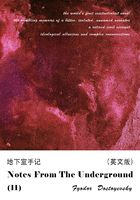Imitation is a necessity for him, provided always that the imitation is quite easy.It is this necessity that makes the influence of what is called fashion so powerful.Whether in the matter of opinions, ideas, literary manifestations, or merely of dress, how many persons are bold enough to run counter to the fashion? It is by examples not by arguments that crowds are guided.At every period there exists a small number of individualities which react upon the remainder and are imitated by the unconscious mass.It is needful however, that these individualities should not be in too pronounced disagreement with received ideas.Were they so, to imitate them would be too difficult and their influence would be nil.For this very reason men who are too superior to their epoch are generally without influence upon it.The line of separation is too strongly marked.For the same reason too Europeans, in spite of all the advantages of their civilisation, have so insignificant an influence on Eastern people; they differ from them to too great an extent.
"The dual action of the past and of reciprocal imitation renders, in the long run, all the men of the same country and the same period so alike that even in the case of individuals who would seem destined to escape this double influence, such as philosophers, learned men, and men of letters, thought and style have a family air which enables the age to which they belong to be immediately recognised.It is not necessary to talk for long with an individual to attain to a thorough knowledge of what he reads, of his habitual occupations, and of the surroundings amid which he lives."[17]
[17] Gustave le Bon, "L'Homme et les Societes," vol.ii.p.116.
1881.
Contagion is so powerful that it forces upon individuals not only certain opinions, but certain modes of feeling as well.
Contagion is the cause of the contempt in which, at a given period, certain works are held--the example of "Tannhauser" may be cited--which, a few years later, for the same reason are admired by those who were foremost in criticising them.
The opinions and beliefs of crowds are specially propagated by contagion, but never by reasoning.The conceptions at present rife among the working classes have been acquired at the public-house as the result of affirmation, repetition, and contagion, and indeed the mode of creation of the beliefs of crowds of every age has scarcely been different.Renan justly institutes a comparison between the first founders of Christianity and "the socialist working men spreading their ideas from public-house to public-house"; while Voltaire had already observed in connection with the Christian religion that "for more than a hundred years it was only embraced by the vilest riff-raff."It will be noted that in cases analogous to those I have just cited, contagion, after having been at work among the popular classes, has spread to the higher classes of society.This is what we see happening at the present day with regard to the socialist doctrines which are beginning to be held by those who will yet be their first victims.Contagion is so powerful a force that even the sentiment of personal interest disappears under its action.
This is the explanation of the fact that every opinion adopted by the populace always ends in implanting itself with great vigour in the highest social strata, however obvious be the absurdity of the triumphant opinion.This reaction of the lower upon the higher social classes is the more curious, owing to the circumstance that the beliefs of the crowd always have their origin to a greater or less extent in some higher idea, which has often remained without influence in the sphere in which it was evolved.Leaders and agitators, subjugated by this higher idea, take hold of it, distort it and create a sect which distorts it afresh, and then propagates it amongst the masses, who carry the process of deformation still further.Become a popular truth the idea returns, as it were, to its source and exerts an influence on the upper classes of a nation.In the long run it is intelligence that shapes the destiny of the world, but very indirectly.The philosophers who evolve ideas have long since returned to dust, when, as the result of the process I have just described, the fruit of their reflection ends by triumphing.
3.PRESTIGE
Great power is given to ideas propagated by affirmation, repetition, and contagion by the circumstance that they acquire in time that mysterious force known as prestige.
Whatever has been a ruling power in the world, whether it be ideas or men, has in the main enforced its authority by means of that irresistible force expressed by the word "prestige." The term is one whose meaning is grasped by everybody, but the word is employed in ways too different for it to be easy to define it.
Prestige may involve such sentiments as admiration or fear.
Occasionally even these sentiments are its basis, but it can perfectly well exist without them.The greatest measure of prestige is possessed by the dead, by beings, that is, of whom we do not stand in fear--by Alexander, Caesar, Mahomet, and Buddha, for example.On the other hand, there are fictive beings whom we do not admire--the monstrous divinities of the subterranean temples of India, for instance--but who strike us nevertheless as endowed with a great prestige.
Prestige in reality is a sort of domination exercised on our mind by an individual, a work, or an idea.This domination entirely paralyses our critical faculty, and fills our soul with astonishment and respect.The sentiment provoked is inexplicable, like all sentiments, but it would appear to be of the same kind as the fascination to which a magnetised person is subjected.Prestige is the mainspring of all authority.Neither gods, kings, nor women have ever reigned without it.















